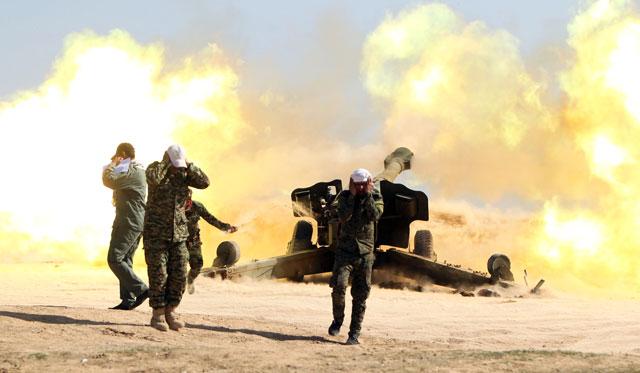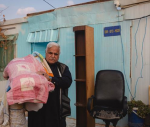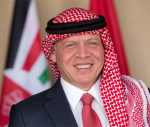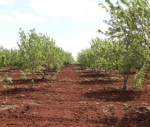BAGHDAD — Iraqi forces killed four militants and ended a hostage crisis after attackers stormed a Baghdad government building Thursday, as nationwide violence took January’s death toll past 900 with elections looming.
The brazen assault on a building in the northeast of the capital comes as security forces grapple with intensifying violence and an extended standoff with anti-government fighters in the western province of Anbar.
It is likely to raise fresh concerns about the capabilities of Iraq’s security forces amid fears the April 30 polls could be partially delayed, as was the case for provincial elections in April 2013.
Six militants wearing suicide vests initially attempted to storm the building, which houses a transport ministry state-owned company, by blowing up a minibus rigged with explosives at the main gate, according to police at the scene.
When the explosion did not go off, one of the attackers blew himself up to clear the way for his fellow militants, followed by a second bomber who set off his vest at an inner gate.
The four remaining fighters then took hostages in the building for several hours before they were eventually killed by security forces, interior ministry spokesman Brigadier General Saad Maan said.
At least two people were killed in the attack overall, including a policeman, and eight others wounded, according to Maan.
A police colonel and an interior ministry official confirmed the account and the toll.
“At the time of the attack, the employees in the building behaved very wisely and shut all their doors,” Maan told AFP. “They kept all the employees inside.”
“The whole operation is now finished, everything is under control.”
Security forces had sealed off the surrounding area, which is home to other government offices, including the headquarters of the transport ministry and a human rights ministry building.
Elsewhere in the Iraqi capital on Thursday, bombings near a market and a restaurant in the Shiite-majority neighbourhoods of Kasra and Talbiyah killed six people, officials said.
They struck hours after car bombs ripped through Baghdad Jadidah, Shuala and Talbiyah, which are predominantly Shiite, leaving nine people dead on Wednesday evening.
Attacks on Wednesday also hit the capital’s outskirts, as well as the northern cities of Mosul and Tuz Khurmatu, killing seven others.
Toll three times higher
Violence has killed at least 911 people in Iraq this month, more than three times the toll for January 2013, according to an AFP tally based on reports from security and medical officials.
No group claimed responsibility for the ministry assault and the bombings, but Sunni militants affiliated with the Al Qaeda-linked Islamic State of Iraq and the Levant (ISIL) have mounted similar attacks in Baghdad.
Iraqi officials on Wednesday, meanwhile, published a rare photograph purportedly of ISIL leader Abu Bakr Al Baghdadi, the first of its kind released by an official source.
The black-and-white picture, which provides a rare glimpse of the man leading a militant group blamed for killing countless Iraqis, shows a balding man with a beard wearing a suit and tie.
The latest bloodletting comes as security forces are locked in battles with militants, including those affiliated with ISIL, in Anbar, a mostly-Sunni desert region west of Baghdad that shares a border with Syria.
It is the first time militants have exercised such open control in Iraqi cities since the peak of violence that followed the 2003 US-led invasion.
Security forces have been locked in battles in Ramadi, where militants hold several neighbourhoods, and have carried out operations in rural areas of Anbar province.
Anti-government fighters also hold all of Fallujah, on Baghdad’s doorstep.
ISIL has been involved, and witnesses and tribal leaders in Fallujah say the group has tightened its grip on the city, but other militant groups have also taken part in the battles.
The standoff has forced more than 140,000 people to flee their homes, the UN refugee agency said, describing it as the worst displacement in Iraq since sectarian conflict in 2006-2008.
Washington has provided Baghdad with weaponry to help it combat militants and also plans to sell Iraq 24 Apache attack helicopters, but diplomats and analysts say the Shiite-led government must do more to reach out to the disaffected Sunni community in order to undercut support for militancy.
















